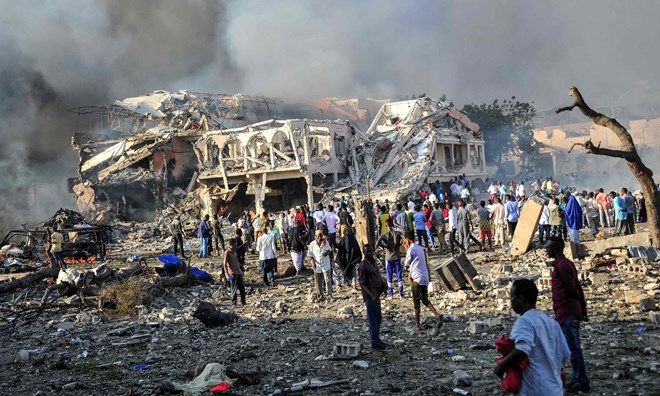
Tuesday October 24, 2017
By Faarah Adan
 ‘It was only when I was admitted into Madina hospital that I began to fully understand the magnitude of the explosion that I had barely survived.’ Aftermath of the truck bomb in the Somali capital Mogadishu, that killed at least 358 people. Photograph: Mohamed Abdiwahab/AFP/Getty Images
‘It was only when I was admitted into Madina hospital that I began to fully understand the magnitude of the explosion that I had barely survived.’ Aftermath of the truck bomb in the Somali capital Mogadishu, that killed at least 358 people. Photograph: Mohamed Abdiwahab/AFP/Getty Images
It was a bright Saturday afternoon in Mogadishu, a clear sky glowing blue above the once beautiful city. The busy K5, or Zoobe Junction, one of Mogadishu’s vital arteries, with its string of shops, hotels and restaurants, was teeming with people from all walks of life. Heavily loaded donkey-carts, rickshaws, cars, buses and trucks all jostled for space through the tightly crammed streets. Across the street, tea women ground their spices at a makeshift tea-stall as a group of elderly men with henna-dyed beards and multi-coloured sarongs were engaged in a deep conversation.
It was my first visit to Mogadishu since I left the country more than 20 years ago. The bustle, the pristine beaches and the scores of returning Somali expatriates all gave me a sense of hope that the “pearl of the Indian Ocean” was, at last, beginning to return to its former glory. Everything seemed quite normal. Intuitively, however, I refused to be at ease just yet, for I have learned during my short stay here that things in Mogadishu can change quite abruptly. And that’s exactly what they did.
I walked through the streets with tremulous enthusiasm, and as people went about their business, the sound of bullets cracked through the air, followed by screeching tires and blaring horns.
Abdi Nur, a 27-year-old journalism graduate who was showing me around the city, pointed to a speeding truck in the distance and shouted: “Lie down! Lie down!”
We took cover behind one of the cars parked by the road and surveyed our surroundings. The truck was heading towards the Zoobe Junction. Not far behind Somali forces were in pursuit, aimlessly shooting. People began crouching down in order to avoid the bullets, with some running back into the shops. But just then a huge explosion ripped through the junction. The explosion was unlike anything I had ever heard, completely demolishing buildings along the road and breaking windows more than a kilometre away.
Immediately after the blast, a series of further explosions occurred at a fuel depot nearby, igniting a huge blaze. Razor-sharp tin roof fragments and shards of glass flew through the air, cutting through human flesh and maximising the harm caused by the explosion.
Despite the fact that I was quite far away from the truck, the shockwave from the blast lifted me off the ground and knocked me against a wall. It slammed hard against my rib cage, but fear and confusion overpowered the pain in my chest. I tried to run away, but no sooner had I started to crawl, than the wall above me came crumbling down, burying me, along with two other young men who were also running for their lives. For what seemed like an eternity, I lay beneath a pile of dust and debris, neither dead nor alive, inhaling the fumes, smoke and dust and waving a weak hand through a small opening, until I was pulled out by some passers by. Abdi Nur was nowhere to be seen.
I was fortunate enough to have survived with minor injuries and a mild concussion, but dozens of people were buried under the demolished buildings, crushed under the weight of the rubble. Others were burned beyond recognition in the explosion and the subsequent fire at the fuel depot.
I managed to walk a few paces before stumbling and falling to the ground. Zoobe Junction was unrecognisable. In front of me, plumes of thick black smoke billowed into the sky and dozens of corpses littered the scene.
Dazed survivors and rescuers poured down on to the road, going from one corpse to another, searching for any hint of life. Some of the survivors had severe bruises and lacerations, some were completely covered in blood, while others simply wandered around, vacantly staring into the burning vehicles, unable to comprehend what had just happened.
More than 350 people died in the blast and the collapsed buildings, according to official government figures, and more than 50 are still unaccounted for. All that remained of the once bustling Zoobe Junction was a pile of mangled wreckage and a blackened road strewn with body parts and burnt cargo.
It was only when I was admitted into Madina hospital that I began to fully understand the magnitude of the explosion that I had barely survived. The corridors of the hospital were flooded with victims with injuries of varying degrees of severity. All were in shock and gripped by intense fear. Distraught relatives searched for their loved ones.
My guide, Abdi Nur, was later also brought into the hospital on a stretcher, with a crushed shinbone. His leg was barely attached to his body and despite the frantic efforts of the doctors, there was little they could do. It was amputated.
It’s now been just over a week since the explosion, and Mogadishu is gradually recuperating. Zoobe Junction has reopened and the debris has been cleared, but while the situation has begun to return to some semblance of normality, the difficulties of life in Mogadishu will continue to deplete the energy of the population. I am thankful to have survived, but desperately sad that such a tragic loss of life could not be prevented.
Faarah Adan is a freelance journalist based in the UK and the US